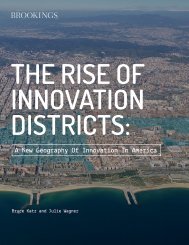TECHNOLOGY AT WORK
1Oclobi
1Oclobi
Create successful ePaper yourself
Turn your PDF publications into a flip-book with our unique Google optimized e-Paper software.
February 2015<br />
Citi GPS: Global Perspectives & Solutions<br />
65<br />
In some cases the digital economy can<br />
make geography less important as<br />
entrepreneurs can offer goods to a global<br />
market<br />
For workers in the rich world, the digital age has thus been a mixed blessing.<br />
Although people living in skilled cities have benefited, many workers in old<br />
manufacturing cities have not. Furthermore, as skilled cities are becoming more<br />
attractive, rising house prices makes them less affordable places to live. This has<br />
implications particularly for the poor, who often cannot afford to relocate to places<br />
where new jobs are available — something that is evident from studies of both<br />
America and France. 90<br />
Housing constraints can also provide constraints on growth. A recent study<br />
estimates that between 1964 and 2009 output in America was 13% below its<br />
potential, due to constraints to housing supply in skilled cities. 91 Thus, so far, the<br />
digital economy has made geography more important, not less.<br />
Self-Employment: The New Normal?<br />
Yet in theory, the digital economy could make geography less important, and in<br />
some cases it has. For example, a recent story in the Financial Times featured a<br />
self-employed worker based in Dharavi — a slum in Mumbai — making around<br />
$20,000 annually selling goods through eBay.<br />
An important feature of the digital economy is that it allows even people in deprived<br />
areas to reach global markets, as even more traditional goods have become<br />
increasingly mobile. Etsy provides such an example, allowing local artisans to reach<br />
customers all over the world through its online platform. In addition to around 750<br />
workers employed in the company’s Brooklyn office, some 1 million self-employed<br />
artisan sellers have emerged worldwide. 92 These entrepreneurs all take advantage<br />
of the opportunities provided by the digital economy, offering their crafts to the<br />
global market.<br />
At the same time, e-entrepreneurship typically requires less capital investment,<br />
while online platforms for crowdfunding make capital more accessible. In other<br />
words, digital technologies have made self-employment an option to a growing<br />
share of workers. This is reflected by the emergence of the “app economy”, which<br />
has grown substantially since Apple launched its app store in 2008. According to a<br />
recent estimate the app economy today provides work for more than 750,000<br />
93 94<br />
Americans.<br />
Yet, while self-employment has been on the rise since the turn of the century, its<br />
causes remain unclear. In Britain, the number of people in self-employment has<br />
increased by more than 30% since 2000, with the result that one in seven is selfemployed.<br />
95 In America, the rise of self-employment has been even more<br />
substantial, growing by nearly 50% over the same period.<br />
90 Anderson et al. (2014); Gobillon, Selod and Zenou (2007).<br />
91 Moretti and Chang-Tai Hsieh (2014).<br />
92 The Economist (2014a).<br />
93 Progressive Policy Institute (2013).<br />
94 Citi’s Internet analyst estimates the “App Economy” grew 45% in 2014 to reach $29<br />
billion and could grow to $52.5 billion by 2017. Native apps, as opposed to web<br />
browsers, have become the primary means of consumption on mobile devices. Mobile<br />
apps make money from paid downloads, app marketing, app commerce and app<br />
advertising. Both Google and Apple share 70% of gross booking with app developers.<br />
While gaming apps and Facebook consume much of the time spent on apps today,<br />
productivity apps are growing quickly, suggesting a broadening of the use case for<br />
mobile phone apps.<br />
95 Dellot (2014).<br />
© 2015 Citigroup










